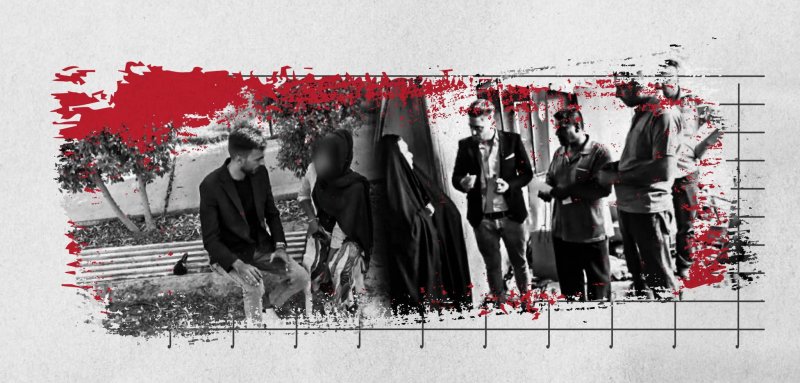Iraqi media – both governmental and non-governmental, along with its institutions, exacerbates the violence, discrimination, and abuse from some governmental, religious or social institutions, or even from their own families, towards women. Many channels broadcast the plight of female and children abuse survivors in invasive ways. Even though they're labeled as ‘humanitarian’, these programs violate the privacy of vulnerable individuals, including victims of rape and violence, homeless girls, victims of broken families, and those suffering from mental and psychological disorders. State-run institutions, especially security institutions, actively participate in and legitimize these violations.
“Are you honorable? How many men raped you? You were raped in this park? Are you still pure or did you fully lose your virginity?” These are some of the questions a twenty-year-old rape victim was asked by Al-Rasheed TV reporter Mustafa Latif. The report also failed to conceal the young woman’s identity. Latif went as far as to ask the victim for details about the rape in front of the camera, which she answered in distress, “I am honorable, I swear.” The girl appeared unsteady and shocked. This raises questions about the humanitarian and ethical role of reporters and the media, their professional integrity in protecting the victim and safeguarding their privacy, and their taking account of any psychological conditions.
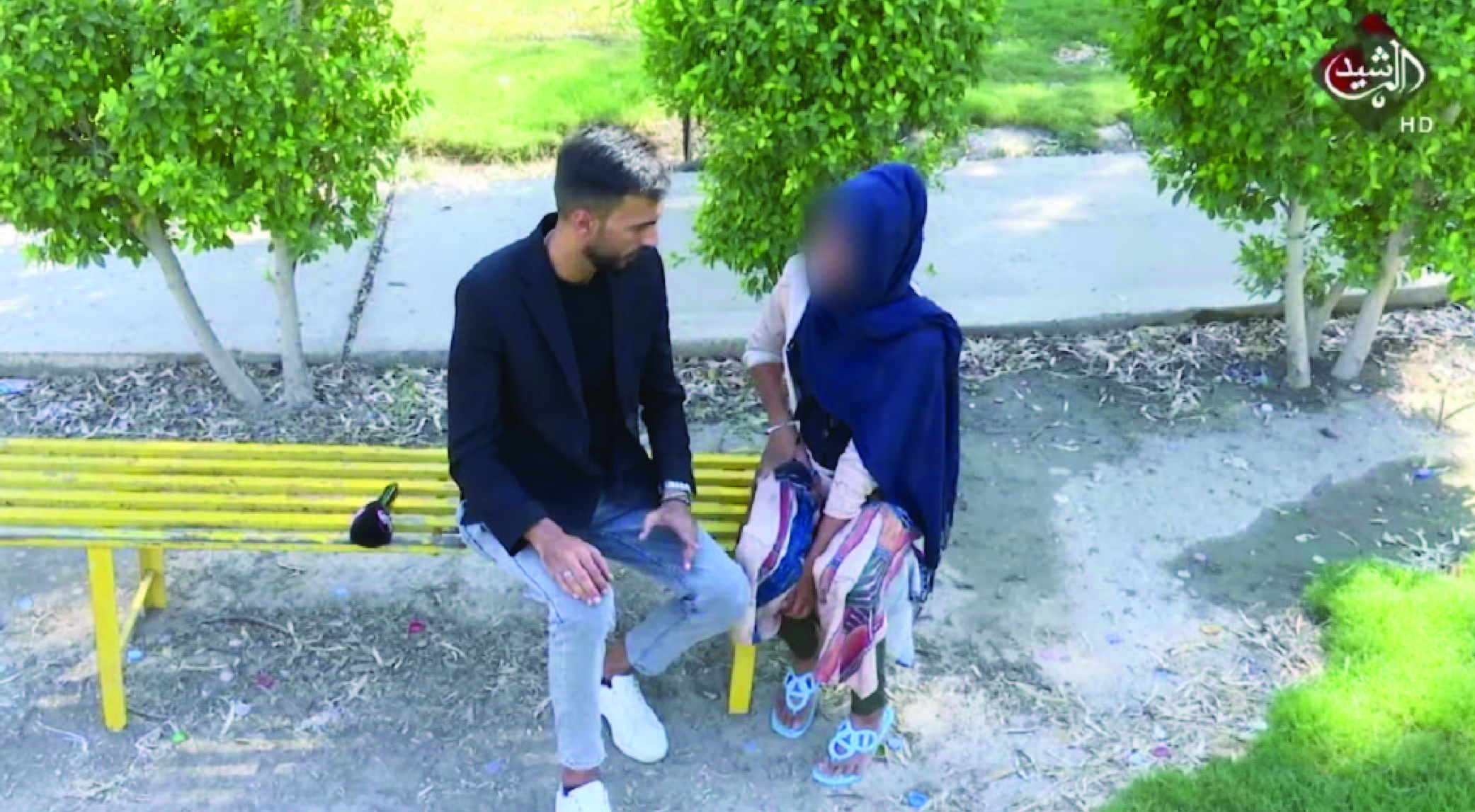 A report by Al-Rasheed TV, in which a rape victim’s identity was fully exposed while being asked invasive questions
A report by Al-Rasheed TV, in which a rape victim’s identity was fully exposed while being asked invasive questions
"Are you honorable? How many men raped you? You were raped in this park? Are you still pure or did you fully lose your virginity?" These were direct questions posed by a reporter on Al-Rasheed TV, to a 20-year-old rape victim without concealing her identity
The Iraqi channel UTV is airing a field program called From Reality, hosted by media personality Ali Athab, who introduces himself as a social and humanitarian healer. In a recent episode titled, ‘A mother forces her orphaned daughters to dance for her new husband, and if they refuse, she severely tortures them’, the show spotlights a broken family, failing to conceal the identities of the seven children involved, aged no older than fifteen. The children cried throughout the episode.
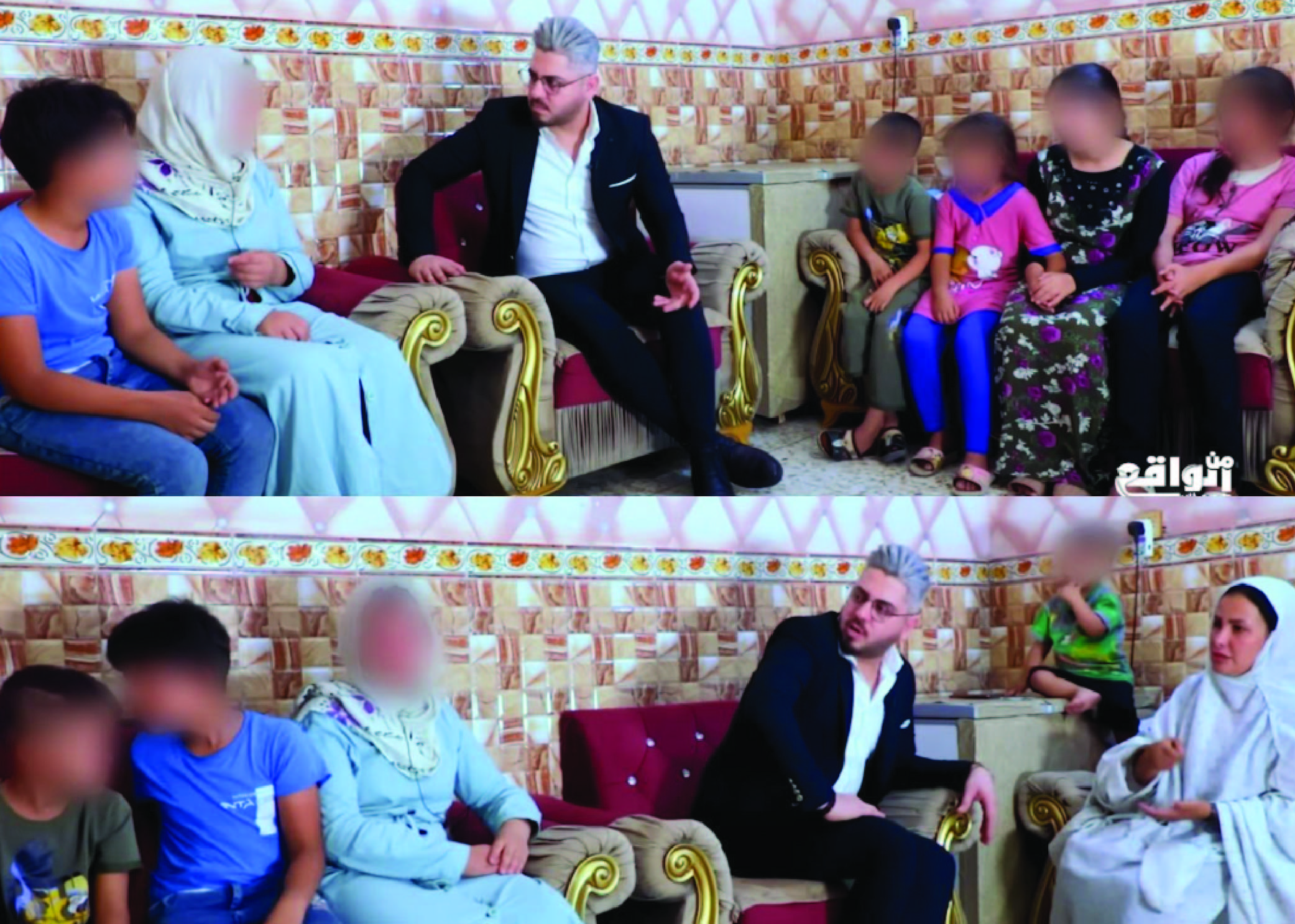 A clip from a tv show showing children's faces in a controversial episode
A clip from a tv show showing children's faces in a controversial episode
“Here we are next to Hawraa, a young child who was subjected to a heinous act of rape,” declard the former Director of Relations and Media at the Iraqi Ministry of Interior and the current advisor to the minister, Major General Saad Maan, as h presented details of the ministry's forces executing the arrest operation of a rapist who assaulted the seven-year-old child. The video, broadcast by the Ministry of Interior and shared on media platforms and social media pages, fails to conceal the girl’s identity, as she lies on a hospital bed, holding a phone and small doll beside her. In the video, one can see a female security officer standing beside the child, along with some family members, in addition to Saad Maan, seated next to the victim, detailing the child and her 4-year-old brother’s kidnapping, before the little girl was raped for five hours. Maan discusses how the investigating judge dealt with the case, mentioning security specifics without safeguarding or even taking into account the privacy and health of the child.
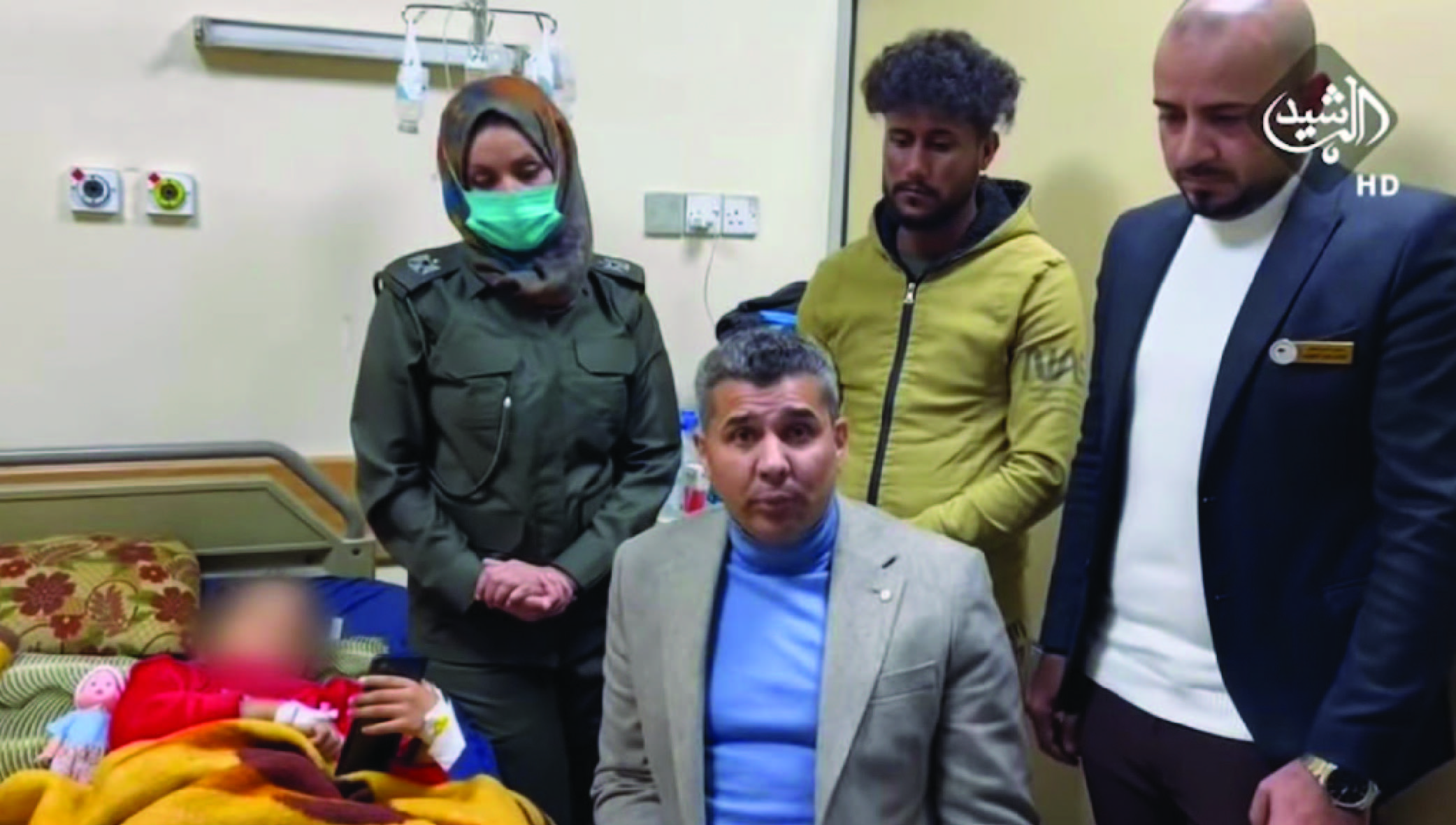 A snapshot from a video in which Interior Ministry Advisor Saad Maan speaks next to a seven-year-old rape victim, fully exposing her face
A snapshot from a video in which Interior Ministry Advisor Saad Maan speaks next to a seven-year-old rape victim, fully exposing her face
Iraqi Community Police has evaded commenting on this issue despite attempts to contact responsible sources within it. They claim to “need approval to answer these particulars.” Further investigation revealed that the Community Police itself is not immune to these practices, and that it is one of the leading institutions when it comes to violating the rights of victims. They have repeatedly documented their activities through their official pages without protecting the privacy of the victims.
In the operation titled ‘Rescuing children from their parents' abuse’, the Diwaniya Police Command published explicit pictures of abused children and circulated them on various platforms before later modifying the images to hide the children's faces. In another operation, ‘The Community Police rescues a girl after she was abused and her hair was shaved off by her aunt in Karbala’, pictures of the operation were leaked and shared. The pictures featured the blurred out faces of the security members who carried out the operation, but the victim's face and identity remained exposed as if she were a prize or trophy obtained by the squad that executed the operation.
The identity of the perpetrator has not been disclosed, perhaps a display of the security forces’ ‘professional ethics’ and adherence to the principle of innocence until proven guilty. Here, the perpetrator can be considered better off than the victim– first the victim of a crime, then the victim of the security forces, before falling victim to society. Perpetrators must be held accountable, and security forces must also take into account that a victims’ rights will be violated again if photographs are published onto social media.
The position of the Iraqi Media and Communications Commission did not differ from that of the Community Police. Officials in the commission also evaded commenting or answering questions related to the issue. As an official institution with the legal and regulatory authority over media outlets, it has the power to find a solution to these problems. According to an unnamed source in the Community Police, responsibility lies with the commission in addressing these issues. The source explained, “Sometimes we encounter this problem, diagnose it, and send it to the Media and Communications Commission because it is their responsibility and authority.”
Serious and far-reaching consequences
Hanin Al-Taie, an Iraqi lawyer and legal consultant, spoke with Raseef22, explaining “The negative effects of this act are numerous, especially in our Arab societies, including tarnishing the reputation of the victim and her family, especially in harassment cases. It plays a role in cases of family breakdown and disintegration, suicide, murder, and other reactions we see in courts. Also, survivors of crimes may be exposed to danger if their identities are revealed, especially if the identity of the perpetrator is also disclosed. Moreover, this can create a barrier of fear for other victims to come forward or file a complaint, fearing shame, scandal, and stigma, especially in areas where tribal customs prevail. The publication, even if not intended to tarnish the reputation or cause harm, may be repurposed by other parties with the aim of damaging the victim's reputation.”
“If after a child is subjected to sexual assault, an interview is filmed and broadcast on tv, this footage will remain for years. So everyone must bear responsibility. If media institutions do not protect victims, their families must”
Mahmoud Al-Najjar, journalist and researcher at the Baghdad Vision Center for Media Development and Studies, shares, “What the Ministry of Interior issued is strange and surprising because it has a very large and specialized media team. Since it deals with cases of rape, harassment, and what is known as 'honor crimes' and other sensitive cases, it should adopt a special approach and not fall into the trap of unprofessional media, because it is a security entity, not a media channel. It is trying to gain fame and take the lead in news because its responsibility is more important, which is arresting criminals and those involved in human rights violations, presenting them to trial, and compensating the victims psychologically, health-wise, and financially in cooperation with other government institutions. And it must fulfill these responsibilities in the best and most committed manner.”
Mustafa Saadoon, the head of the Iraqi Observatory for Human Rights, informs Raseef22, “There are future repercussions for these behaviors. If a child is subjected to sexual assault, filmed, and broadcast on television, these scenes will remain after 10 years. Digital memory lasts a long time and this will cause psychological problems. Therefore, everyone should bear responsibility. If media institutions do not protect them, the family must. If the family has no understanding of this issue from a legal and guideline perspective, or how to deal with the children, the role of the journalist in protecting them becomes crucial. If the journalist does not know how to conduct interviews with children or victims, this is a major disaster. Nevertheless, the responsibility falls more heavily on the publishing institution or the editors-in-chief.”
He adds, “There are reporting guidelines from UNICEF regarding the publication of children's pictures. These guidelines do not prohibit conducting interviews with children, but set ethical and humane standards and professional ethics criteria. The purpose of publishing this story and protecting the interests of children must be met, while also explaining why this story will be published. Their safety must also be taken into account, avoiding exposing them to danger, preventing damage to their reputation, and not deceiving them regarding the appearance of their images and the disclosure of their identities.”
Memes and sustained harm
“It was against my will”, these words, pronounced in a heavy Iraqi accent, have been widely circulated across social media in Iraq. They are the words of a woman who was kidnapped and raped by a drunk man, in response to the investigator's question about her consent.
The video from the Al-Musayyib Crime Control Center in Babil Governorate in central Iraq, which was filmed in an organized manner, shows a dialogue between the security officer (G.H.A. Al-Jaashami) and the lady who was raped at gunpoint, as she tells the security officer that the accused had sex with her against her will. The officer asks her for detailed information on the incident, handling the situation as if he is holding a box of popcorn and enjoying the conversation, asking her questions like, “Did the intercourse take place from behind (the anus)? By force or willingly? How many times? From behind or from the front?” She answers, “It was forceful, against my will” in front of the camera, in a clear violation of the “professional secrecy in investigations” as described by security customs.
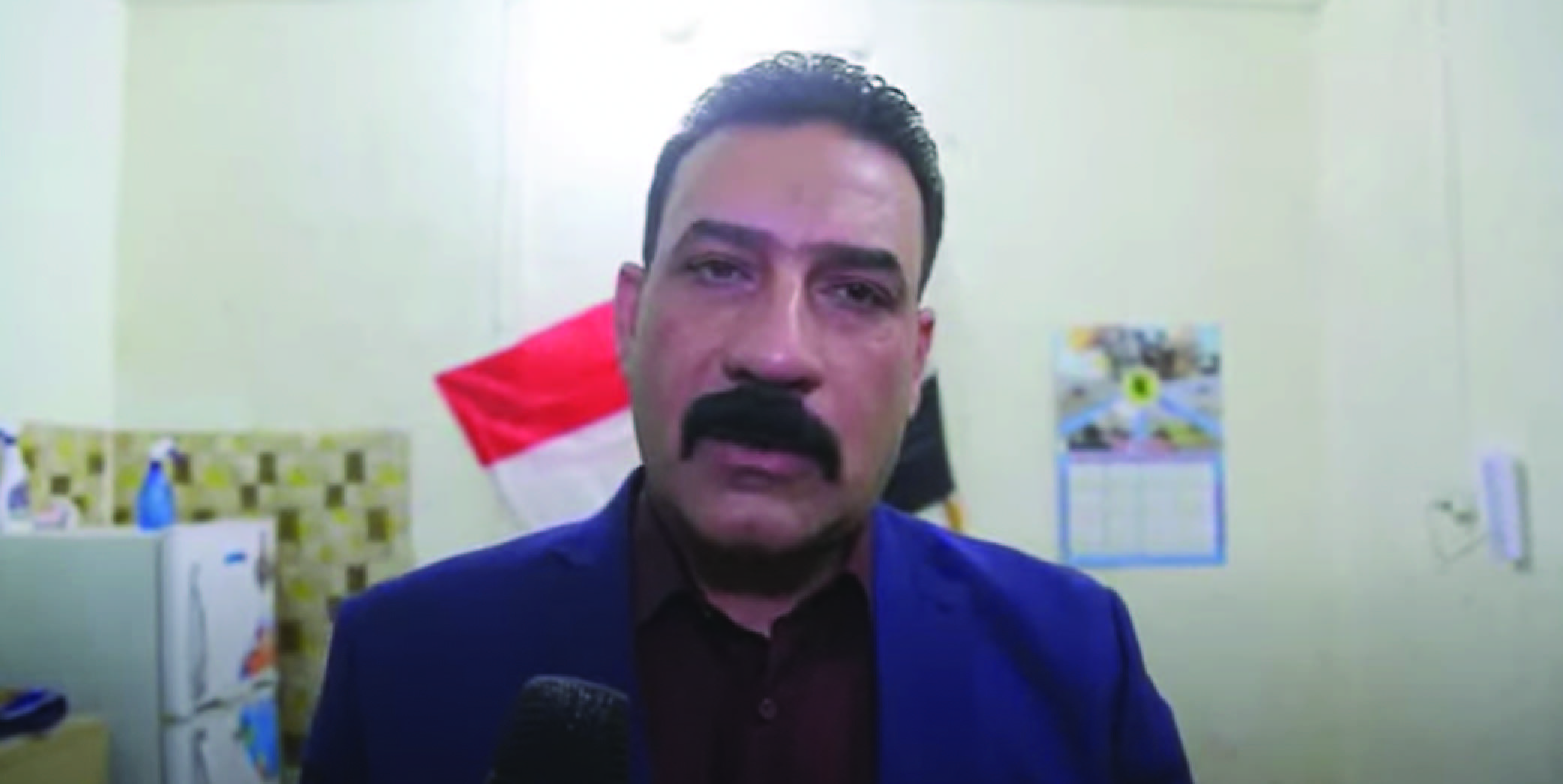 The director of the Al-Musayyib Crime Control Center speaks during a video in which a rape victim's identity was shown while he was interrogating her
The director of the Al-Musayyib Crime Control Center speaks during a video in which a rape victim's identity was shown while he was interrogating her
In the years since the video was circulated, a search was conducted on this lady to find out her situation after the incident and her video becoming a meme. However, no solid leads have been found, only repeated specific answers from search sources, sometimes saying she committed suicide, and sometimes that she burned in an accidental fire at her home. In addition, her 24-year-old son disappeared without any other information about him, and this was the cause of the irresponsible dissemination of the video.
Fabrication can also be done
In another television episode hosted by Athab, which garnered 10 million views, titled, ‘The most dangerous jinn in Baghdad eats cats, attacks children, and expels families,’ the viewer is introduced to a young woman, living with her mother and daughter, suffering from psychological disorders after discovering that she was her husband's second wife. The footage appears to have been filmed without the consent of the homeowners, with the young woman repeatedly yelling, “Get out, you and your filming, outside!” Despite her refusal, her words and distress were repeatedly ignored, and Athab insisted on continuing with the interview, in a violation of his subject’s wishes. After some pressure, she later agreed to talk to him.
One might think that these episodes are scripted, a prearranged agreement between the parties to produce stories like these with the goal of evoking sympathy from the viewers and exploiting their emotions. Former Iraqi Minister of Interior, Qasim Al-Araji, issued a statement on February 20, 2018, announcing that the ministry was investigating one of the episodes of the journalist Ali Athab. It was found that “they reached the citizen in question in the case, and she had openly admitted that the program's presenter had agreed with her for a small amount of money to fabricate and concoct this false story to get media coverage at the expense of the principles of the media profession.” This indicates the existence of cases of fabrication and distortion of facts. Athab did not stop his program. Besides falsifying facts, human rights activists say he contributes to further exploitation, undermining the credibility of the many actual victims in Iraqi society.
Video footage shows a victim, raped at gunpoint, being interrogated with questions including, “Did the intercourse take place by force or willingly? How many times? From behind or from the front?” Her response, “It was against my will”, would later become a meme.
Al-Najjar emphasizes that “publishing these scenes certainly does not comply with the principles of journalism and media because it is considered a violation of the victim's privacy. Additionally, it is defamation. The wide dissemination of these scenes falls under the scope of media scoops and presents the one covering this story as the savior. However, it is a double-edged sword that does not save the victim but exposes and sensationalizes her story in the media, watched by millions of people. Therefore, I do not believe that there is a public interest that justifies filming these scenes in this way, especially if the victim is a young child. In such cases, the rapist and the perpetrator should be filmed, exposed, and their punishment should be announced directly to the media, so that others do not repeat this criminal act that violates human rights.”
Hanin Al-Taie explains the laws surrounding protecting the privacy of victims in Iraq, “The right of victims not to publish their pictures is considered a personal right closely related to human dignity, as recognized by most international constitutions. Therefore, Iraqi Penal Code No. 111 of 1969 criminalizes publication in Article 438. The article states that anyone who publishes, by any public means, news, images, or comments related to the private or family secrets of individuals, even if true, with the intention of harming them, will be punished with imprisonment for a period not exceeding one year or a fine not exceeding one hundred dinars, or with either of these two punishments.”
According to Al-Taie, “this text addresses publishing related to disclosing the private life and secrets concerning individuals, especially if the purpose is to harm them. For the criminal intent to be fulfilled, the publisher must have (knowledge and intent) and exploit the incident of the assault on the victim or the intent to cause psychological harm, even if not an accomplice in the crime. Therefore, the publication or disclosure of the victim's identity should have criminal intent. If what is presented on most television channels and social media platforms is done with the victim's knowledge, the criminal intent is not fulfilled since the victim has willingly accepted it. Here, the primary legal responsibility for protecting the victim's privacy is the victim themselves. Conversely, criminal intent is fulfilled, and it is subject to the law under Article 438 of the Penal Code, and the victim has the right to claim compensation for the damage caused to them under the provisions of civil law.”
The methods of mocking the victims vary, and memes ridiculing survivors and victims are being circulated widely on the digital space with no regard for their dangerous and violent repercussions.
A 12-year-old child likely does not understand the concept of privacy and may not be aware that there are over 4 million views of their tears and family dynamics on YouTube. Memes spread rapidly on social media and can create long-lasting and memorable trends, impossible for the subject of the trend or meme to forget, especially when they are subjected to mockery and ridicule.
The methods of mocking the victims vary, and memes ridiculing survivors and victims are widely circulated on the internet with no regard of their effects. Media is the main perpetrator, as it exploits personal and family issues to generate content, taking advantage of vulnerable victims, exacerbating the situation by turning a story of human suffering into click-bait or even, a joke– a mockery of the victims' wounds. Stories such as these do not spread due to the lessons they carry, but rather, because they have been transformed into material for humor and entertainment.
Raseef22 is a not for profit entity. Our focus is on quality journalism. Every contribution to the NasRaseef membership goes directly towards journalism production. We stand independent, not accepting corporate sponsorships, sponsored content or political funding.
Support our mission to keep Raseef22 available to all readers by clicking here!
Interested in writing with us? Check our pitch process here!
